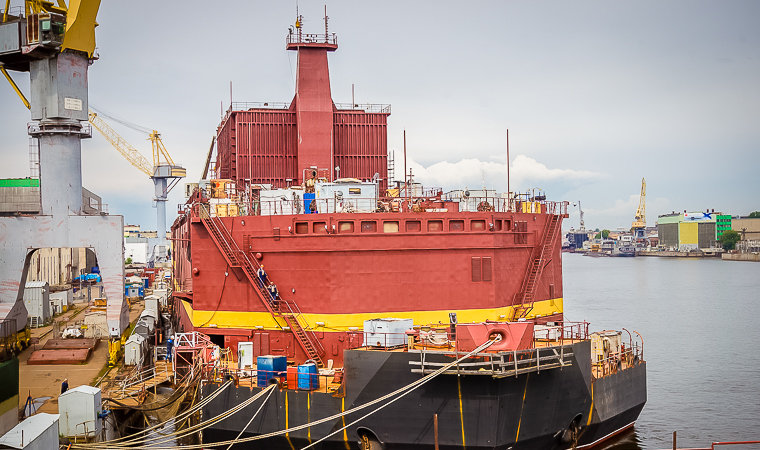
FNPS Trials
back to contentsThe purpose of the trials is to test the functionality of the stations’ equipment and systems, as well as their compliance with the design specifications. “Dock trials are the most essential step in the construction, marking the start of its final stage,” noticed Alexei Kadilov, General Director of the Baltic Shipyard building the floating nuclear power station. “Started over a year before the commissioning, the station’s dock trials will enable to remove possible malfunctions in its systems, equipment and mechanisms.”
Sergei Zavyalov, RosEnergoAtom’s Director for FNPS, explained that the trials would run simultaneously with fitting-out in fuel loading compartments, engine control rooms and engine rooms, which is why security would be tightened.
Completion of the dock trials is scheduled for 30 October 2017. Once the trials are over, the Akademik Lomonosov will be towed along the Northern Sea Route to the place of its operation and connected to the onshore infrastructure. In the fall of 2019, RosEnergoAtom plans to place the floating unit in its permanent position, as well as re-test and commission the FNPS.
The Project 20870 floating power unit is intended to be a part of the floating nuclear power station. The station is equipped with KLT-40S nuclear reactors that can generate up to 70 MW of power and 50 Gcal/h of heat under standard working conditions, which will suffice to meet the needs of a city with over 200,000 people.
Floating nuclear power stations are planned to be used in the Far North and Far East. Akademik Lomonosov is a flagship FNPS to be delivered to Pevek, a city in the Chukotka Autonomous Area. The floating nuclear station is the world’s first and so far unparalleled project of a small transportable power plant.
Its primary goal is to provide power for large industrial enterprises, port cities, and offshore gas and oil platforms.
With displacement of 21.5 thousand tons, the station may also be utilized as a desalination plant producing 240,000 cbm of fresh water daily. The station’s service life is 35–40 years, with reactor fuel changed every 2.5–3 years. Operated by around 70 people, the floating facility has been designed to withstand extreme impacts, such as tsunami and other natural disasters. Besides, all nuclear operations on such ships comply with all IAEA standards, posing no threat to the environment.




